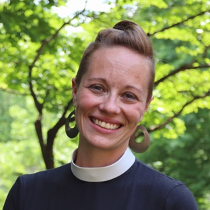Everyday Spirituality: The Blog
House of Prayer for All | blog

“My child was too disruptive in worship, so we were asked to leave.” I’ve heard this from too many parents of disabled children. The church longs for young people, but when those young people are intellectually disabled or Neurodiverse the caveats begin: “We want young people who can sit still,” or “we want young people who can be quiet,” or, “we want young people who will do the work for us and contribute financially.” This is a larger systemic issue about why we want people in the church (for our own survival, or the sake of the Gospel?). I have found that too often in churches inclusion means diversity is welcome as long as they look like us.
In a former call, I found myself working with a Lutheran pastor to create worship for those who were considered “disruptive.” These were kids who were diagnosed with Autism and ADHD and brain trauma, but also kids without formal diagnoses attended, too. These were people who didn’t fit in to the “traditional” worship – they made noise, they moved around, they jumped and played – and it was delightful.
As this pastor and I began working with community organizations and concerned parents, doing a feasibility study and researching other communities that had done similar work, one of my children was diagnosed with an intellectual disability. I can’t explain the timing. I can’t begin to describe how this transformed me. Yet, it shifted my entire worldview for the better. Suddenly, my child was the one who couldn’t sit quietly in worship, and I longed for them to be themselves without fear of judgment.
Taking the time to meet people in the disability community, centering their stories instead of my own, and trying to see the world through my child’s eyes was life changing – and life giving. Friends, it saved me. Shortly after my child was diagnosed, I remember attending a service where the minister preached that God would heal any disability if we just had faith. It took all my strength to stand up and say (calmly) that my child would never be “healed” – and doesn’t need healing – because that’s an ableist perspective that gives more value to those who are deemed “normal.” I spoke clearly and said, “My child will never be healed – but by changing my life, they have healed me from my narrow thinking.”
(To learn more, please visit these sites:
Rejoicing Spirits – ministry with the intellectually and developmentally disabled people, through the Evangelical Lutheran Church of America – https://www.rejoicingspirits.org/
Presbyterians for Disability Concerns – resources for congregations – https://www.presbyterianmission.org/ministries/phewa/pdc/
Institute on Theology and Disability – https://faithanddisability.org/institute/)

Rev. Katrina Pekich-Bundy
Rev. Katrina Pekich-Bundy is a spouse, mother, and writer. She is the minister at First Presbyterian Church of Alma and the Associate Protestant Chaplain at Alma College in Michigan.

0 Comments